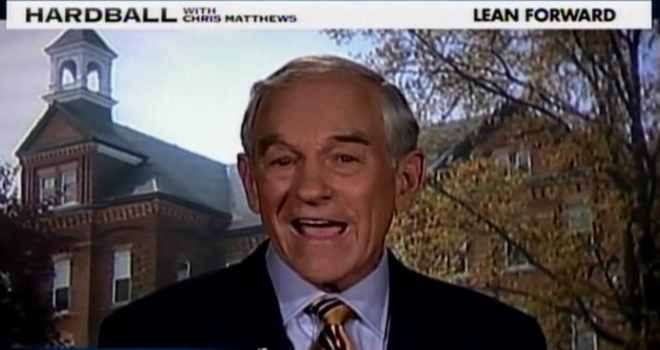Another Paul family political announcement, another battle on MSNBC over the landmark law that helped end segregation in America.
Just about a year after his son Rand Paul stepped in it when he told Rachel Maddow he was opposed to provisions of the 1964 Civil Rights Act, Rep. Ron Paul (R-TX) told Chris Matthews Friday he wouldn’t have voted for the law in the first place had he been in Congress at the time.
Rand’s statements on the law (which he later retracted) came during his first week as the Republican nominee for Senate in Kentucky in 2010. Ron’s criticisms of the law came on the day he declared his third run for the presidency.
“Yeah,” he told Matthews when asked if he would have voted against the act in Congress. “But I wouldn’t vote against getting rid of the Jim Crow laws.”
Ron, like his son, said that his statement about the Civil Rights Act has nothing to do with the law’s intentions — i.e. ending institutionalized discrimination in a wide swath of American life, including in the public accommodations where African Americans were denied service at the height of the Jim Crow era. Paul said he would vote against the law because it imposed unfair rules on what private business owners can and can’t do on their own property. Essentially, they should be free to discriminate if they wish, Paul says, however distasteful that may be.
Paul:
I believe that property rights should be protected. Your right to be on TV is protected by property rights because somebody owns that station. I can’t walk into your station. So right of freedom of speech is protected by property. The right of your church is protected by property. So people should honor and protect it. This gimmick, Chris, it’s off the wall when you say I’m for property rights and states rights therefore I’m a racist. That’s just outlandish.
Paul added that any talk of the segregated South that the Civil Rights Act aimed to reform is too old to be relevant anyway, saying the specter of Whites Only signs is “ancient history.”
Besides, Paul says that the Jim Crow laws would have ended without the Civil Rights Act anyway, a view held by many libertarians who believe the free markets solve social problems.
When Rand Paul said something similar in 2010, it generated national headlines and caused Republicans to worry they’d picked the wrong man in Kentucky. Those fears proved to be unfounded, as Paul went on to win a seat in the Senate by a sizeable margin.
Ron Paul is not likely to earn the same media scrutiny for his statement on Hardball. Nor is his run for the White House likely to end in the same result as his son’s Senate race did. Whereas Rand was new on the scene, Republicans are accustomed to Ron’s special brand of Republican libertarianism, which draws ardent support in the party as well as strong opposition.
Watch Ron Paul and Matthews battle it out over Civil Rights:






